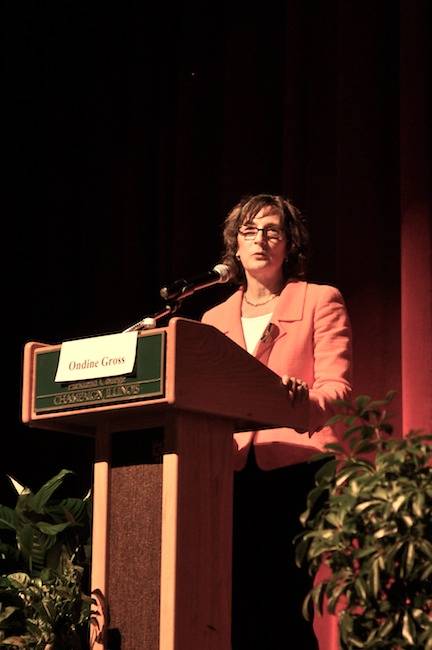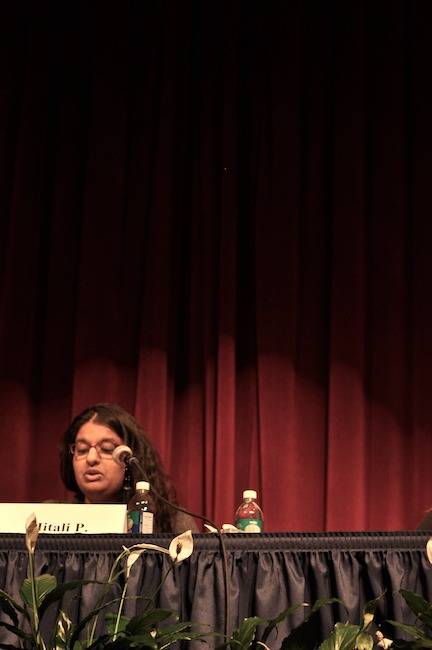
It was an evening full of laughs, tragedy, and new strategies.
Last Monday, the East-Central Illinois Safe Schools Alliance, or eCISSA, a division of the Illinois Safe Schools Alliance, held a long-planned forum at the Parkland College Theatre.
The forum, composed of nine panelists that included teachers, students and administrators, discussed LGBT equality and safety in area public schools, focusing specifically on bullying.
The group spoke to the packed theater for about two hours, which included Q&A time. The forum was notably attended by State Superintendent, Dr. Christopher Koch. Koch began the forum with a few remarks on what he and his colleagues have done to improve the safety of gay students, and what needs to be improved. “In order for students to succeed at school, they must feel physically and emotionally safe,” said Koch.
 The moderator for the event, public school psychologist Odine Gross (right), also briefly spoke about her background in youth psychology, which dates back to the early 1980s. Until recently, she has transitioned herself to focusing solely on LGBT youth in schools. “It is now my goal that all schools, as well as our communities, become safe zones,” said Gross.
The moderator for the event, public school psychologist Odine Gross (right), also briefly spoke about her background in youth psychology, which dates back to the early 1980s. Until recently, she has transitioned herself to focusing solely on LGBT youth in schools. “It is now my goal that all schools, as well as our communities, become safe zones,” said Gross.
PANEL DISCUSSION
Dr. Steven Aragon, researcher and professor of the University of Illinois, who led off the panel, said that questioning students are more likely to not do well academically. “Questioning students in the ninth grade are seven times more likely to say that they will not finish high school; the environment is not set to success,” he said. “I don’t think we’re well prepared for helping students come out.”
Dr. Aragon, who has done research on the LGBT community for years, says that media influence plays a big part in how society perceives the gay community. “We see so much in the media that paints such a wrong picture of who we really are,” he said.
Steven Higgens, a social worker at Urbana Middle School, also a panelist, said he deals with coming out issues on the front lines. He cited his own son’s coming out as the point in his life where he changed his attitude towards the LGBT community. “When my son said, ‘Dad, I’m bi,’ I learned a great deal from that moment.”
There were three area high school students on the panel as well. Three were former students, and one current, a senior currently attending Urbana High School. That student, Kendall Johnson, who is gay, said his experience coming out of the closet was relatively smooth. “I had it pretty easy and my parents were accepting,” Johnson said.
“The pressure to be ‘normal’ is tough for most students,” said Johnson. “People assume that LGBT students have a one track mind. No student should ever have to go to school and not feel safe.”
Former high school student Janelle O. had a very different experience. Janelle, who is straight, discussed the hardship she had to endure when she tried to start a Gay Straight Alliance at Mahomet-Seymour High School two years ago. She said the school administration was hesitant to use the word “gay” and insisted on naming the club “Diversity Club.”
Janelle resisted. “We saw the hypocrisy in our administration…I think they knew that they were doing was wrong, and I had to watch my friends suffer the consequences of my administration’s inaction,” said Janelle.
Janelle also stressed that rooting bullying from its core is critical in providing a safe environment for students. “No student, no matter who they love, should be denied the right to an education,” she added.
 Another panelist, Mitali P. (left), a graduate of Central High School in Champaign, and co-founder of eCISSA, discussed her experience of coming out in an Indian family.
Another panelist, Mitali P. (left), a graduate of Central High School in Champaign, and co-founder of eCISSA, discussed her experience of coming out in an Indian family.
“Many students, such as myself, have to choose between their culture and the culture forced upon them at school,” she said. “Many times, neither group is understanding.”
Urbana High School Principal, Dr. Laura Taylor, said piecing together the reasons why some students feel uncomfortable over LGBT students can be challenging.
“Since schools are mirrors of our society, these socially constructed beliefs play out in our daily endeavors in our classrooms, hallways, and athletic fields,” she said.
Principal Taylor also said she created a Social Justice Committee at Urbana High School to help curb school bullying. “No matter what the subject, I make it clear that issues of social justice are important to me — that I want all students to feel a sense of belonging to our school,” said Dr. Taylor. “I expect [students] to treat each other with respect.”
Celeste McCarty, a school district attorney, said that laws, such as the Illinois Human Rights Act, need to be fully recognized. “It’s a matter of trying to get the school board and administration to enforce it,” McCarty said.
McCarty cited a recent court case in Wisconsin in which a middle school student was abused so much, that he dropped out and moved to Minnesota. “Does the victim have to do their own investigation?” McCarty questioned the audience.
The forum took an emotional turn when a former high school student, Jesse L., gave a graphic account of the abuse she endured while at school. Jesse noted her school administration’s complete lack of support.
“My dean told me that I had ‘brought it [being gay] upon myself,'” Jesse said. She delved into her past of numerous beatings, teacher abuse, and suicidal thoughts. Her tearful, and emotionally-charged recitation invoked the same in the audience, and sobs could be heard in the auditorium.
THE COMMUNITY RESPONDS
Many high school students turned out to show their support for safer schools. Urbana Sophomore Elena Wentworth said that her participation in Urbana High School’s GSA is what brought her out to the forum. “I wanted to see what people had to say. I don’t know what the problem is [for equal rights for LGBT students].”
Junior Sophia Spooner of Urbana wanted to hear the panelists’ individual stories. “Gay rights is a really important issue here and everywhere,” said Spooner.
Camilla Black is a senior at the local catholic school, St. Thomas More. “I go to St. Thomas More and it’s a really conservative school. I hear really homophobic remarks, and I don’t think it’s right.” Her friendship with a panelist is what inspired her to attend. “The world needs more love,” she said.
Sue Keller, a mental health worker at the Mental Health Center of Champaign County, says that fairness and justice has always been important to her. “…That kids stay in school and are not harassed; it’s critical we address the problem directly,” she said.
Katy Weseman, assistant director of the LGBT resource center at the University of Illinois, held a booth in the hallway outside the theatre. “We provide great programming to educate students and support for the LGBTQ community,” Weseman said.
Elaine Gehrmann, who serves on the Urbana School Board, and a parent of two students at Urbana High School, said the work she does with Urbana’s social justice committee (who also had a booth) is what roused her to attend the forum.
“The district needs to take a clear stand on teen security, no matter their orientation,” Gehrmann said. “We need more education and training for our teachers.”








